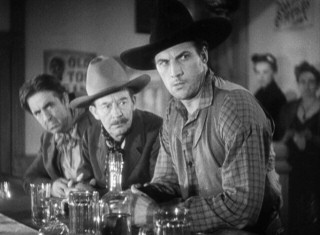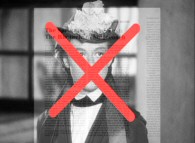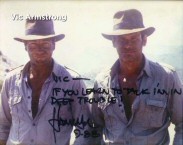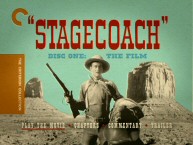Stagecoach: The Criterion Collection DVD Review
 |
Stagecoach
Theatrical Release: March 2, 1939 / Running Time: 96 Minutes / Rating: Not Rated Director: John Ford / Writers: Ernest Haycox (original story), Dudley Nichols (screenplay) Cast: Claire Trevor (Dallas), John Wayne (Henry the Ringo Kid), Andy Devine (Buck), John Carradine (Hatfield), Thomas Mitchell (Doc Josiah Boone), Louise Platt (Lucy Mallory), George Bancroft (Marshal Curley Wilcox), Donald Meek (Samuel Peacock), Berton Churchill (Henry Gatewood), Tim Holt (Lieutenant Blanchard), Tom Tyler (Luke Plummer), Chris-Pin Martin (Chris - uncredited), Elvira Ríos (Yakima - uncredited) |
Buy DVD from Amazon.com • Buy Blu-ray from Amazon.com
Ask anybody who knows anything about film what cinema's finest year was and most will tell you 1939. That year saw The Wizard of Oz and Gone with the Wind released within four months of each other. It also produced some of the greater works of some of the greatest minds making movies back then. Frank Capra and Jimmy Stewart gave us Mr. Smith Goes to Washington, Wayne had appeared as an uncredited extra in seven Ford films made from 1928 to 1930. Since then, he had risen to leading man material, playing heroes almost always named John in small, forgotten B westerns. Stagecoach, which would be Wayne's star-making film, was John Ford's first sound western. Ford had directed plenty of silent westerns (few of which survive today), but in his first ten years of talkies, he had made war dramas, seafaring adventures, a Shirley Temple movie, and mistaken-identity comedies. Stagecoach would not only establish a regular partnership with his friend Wayne (which would run for 25 years through Donovan's Reef in 1963), it would confirm Ford, already an Oscar winner for 1935 IRA drama The Informer, as one of the most admired directors in the business.
Set in the wake of the Civil War, this film lets us travel west from Arizona territory to New Mexico. The titular vehicle gathers a diverse lot of strangers from various walks of life. Our initial point of entry is Lucy Mallory (Louise Platt), a quiet soldier's wife intending to meet her husband. She is joined by two people driven out of town by the women's league of law and order: broke, ever-drunken Doctor Boone (Thomas Mitchell) and Dallas (top-billed Claire Trevor), a woman of ill repute. Also present are Mr. Peacock (You Can't Take It With You's Donald Meek), a worrisome Kansas City whiskey drummer, and Mr. Hatfield (John Carradine), an interested gambler who fought under Lucy's father and now offers her his protection.
The final two passengers are picked up along the way: banker/embezzler Gatewood (Berton Churchill) and, fresh off a prison break, fugitive outlaw Ringo Kid (John Wayne). At the head of the stagecoach are its driver Buck (Andy Devine), comic relief who complains about his large Mexican family, and marshal Curley (George Bancroft), who's looking to collect the reward on Ringo.
The group is destined for a town called Lordsburg, which is problematic because that requires going through Apache country, where Geronimo and company are rumored to be on the warpath. The stagecoach is escorted by soldiers only part of the way; the rest of the trip, they're on their own, a fact observed with caution and concern.
Today's notion of the western genre calls to mind saloons, deadly showdowns, and gun-toting lawmen and criminals. Stagecoach provides all of these staples, but saves most of its action for the final act, which culminates with a hotly-anticipated vengeance shootout that pits Ringo against troublemaker Luke Plummer and his two brothers. There isn't a gun fired until the film's final 25 minutes, when an extended scene excitingly offers little more than that.
For the first three-quarters, the film is a light, character-driven ensemble drama. With the distinct personalities established quickly and effectively, we're able to tag along and observe. With the threat of Indian savagery looming, two unlikely couples seem to form between ladylike Anna and her protector Hatfield Stagecoach was instantly hailed by critics and audiences. Had it come a few years earlier or later, it might very well have won the Academy Award for Best Picture. Having debuted in legendary '39, simply getting nominated was a major honor. While the epic Gone with the Wind cleaned up, Stagecoach didn't leave that year's Oscars empty-handed. It won the awards for supporting actor (Thomas Mitchell, who also appeared in Wind and later It's a Wonderful Life as Uncle Billy) and Best Music - Scoring. The latter category was new, different from Best Music - Original Score, which went to The Wizard of Oz. The work of musical adaptors Richard Hageman, W. Franke Harling, John Leipold, and Leo Shuken plays with American folk songs, a tactic sure to disqualify such efforts nowadays in the one confusingly-policed score category. Stagecoach's other Oscar losses were for director, editing, art direction, and black and white cinematography, all but the last honor going to Wind.
The film is remembered and celebrated for much more than simply being the real beginning of the Ford-Wayne collective, which would come to include The Quiet Man, The Searchers, and The Man Who Shot Liberty Valance. Orson Welles claimed he studied Stagecoach with nightly viewings during the making of his debut feature Citizen Kane, long and widely accepted as the greatest film ever. Stagecoach's more modest modern-day accolades include placement on two of the American Film Institute's lists; ranking 63rd on 1998's original "100 Years... 100 Movies" countdown (it was among the number of films that dropped off in the AFI's 2007 tally) and coming in ninth among ten western films in 2008's genre-based "10 Top 10" (sadly and seemingly the end of the yearly AFI list summer tradition).
Stagecoach has been notably remade twice, first in 1966 with Bing Crosby and Ann-Margret and again in 1986 as a TV movie starring the country crossovers of The Highwaymen: Kris Kristofferson, Willie Nelson, Johnny Cash, and Waylon Jennings.
The original film is no stranger to DVD, having first shown up in the format's first year (1997) from gung-ho adopter Warner Home Video. In June 2006, it was revisited in one of the studio's satisfying Two-Disc Special Editions. The following spring, the first disc of that set was reissued in Warner's new John Wayne Collection line. All of Warner's releases have since been discontinued, but late last month, Stagecoach found a new home in The Criterion Collection, the independent studio considered unrivaled in the restorations and supplements they bestow upon classic films. For the small but electronically vocal part of the population that has graduated to Blu-ray Disc, the real attraction is Criterion's hi-def debut on that format. Since I'm still beyond satisfied with standard DVD (at least until a multi-disc Blu-ray player can be easily swapped for my 5-discer), that is what I review here. The two-disc set is given the subtle spine number 516.
VIDEO and AUDIO Stagecoach's 1.37:1 Academy Ratio is upheld in the DVD's mildly windowboxed "fullscreen" transfer. Criterion's restoration efforts are well documented, so it's a little surprising to find plenty of imperfections here. There are some scratches that appear throughout, a ghosting effect, and occasional junk (hairs, darkness) on the frame's edges. One shot even displays a glaring smudge in the center of the screen. On the whole, though, the picture is generally pretty clean and, perhaps more importantly, consistent. There are no jumps or reel change marks. There is an appropriate amount of grain and a satisfying level of detail. This may not be the studio's most exemplary restoration, but it is well beyond adequate, as all the minor shortcomings are fairly excusable due to the film's age and the issues detailed in the booklet's transfer page. True to its original design, the film is presented in a single-channel monaural soundtrack. The elements are clearly dated and the mix never shakes a slight hum and hiss. While I consider this audio acceptable, the included subtitle track is sometimes useful (sadly, Criterion has yet to extend this luxury to bonus features).
BONUS FEATURES, MENUS and PACKAGING Disc One contains just two bonus features. First and more substantial is an audio commentary by film historian/professor and western scholar Jim Kitses. Evidently reading from a script, Kitses is more rehearsed, calculated, and scholarly than most commentators. Despite this approach, he stills spends much of the time remarking about what's on screen (I can only imagine the kind of preparation this required). Stagecoach's original 3½-minute theatrical trailer unexpectedly opens with talk of aviation and other modern transportation, segueing into the yesteryear streamline in which the film is set. Disc Two's contents begin with another film directed by John Ford, 1917's silent Bucking Broadway (54:24). One of Ford's earliest works, this comedy western tells of a love triangle, as a simple Wyoming rancher (played by Harry Carey, Sr.) tries to regain the girl (Molly Malone) he lost to a mustachioed horse inspector from New York City (Vester Pegg). A copy of the film, long feared lost, was discovered in 2002 and restored. That explains why, alternating between gold and green tinting, it looks and sounds fresh with new intertitles and piano score. Unfortunately, it did very little for me on any level, beyond reminding me that a lot of silent films are really boring by today's standards. Next up is British presenter Philip Jenkinson's extensive 1968 video interview (1:12:23) of John Ford. While smoking one cigar after another, Ford discusses himself and his film work. One sympathizes with Jenkinson, having to deal with the hard of hearing and remarkably cranky director. The confrontational Ford, five years from death, questions the questions, nitpicks over wording, and lingers on the "language barrier." He does open up about his improvisational methods, aversion to violence, and experiences with Will Rogers, John Wayne, the Navy, and the Navajo. Ford is more animated talking about other things, asides about British politics, beer, and Winston Churchill. While he testily sidesteps weighing in on the Indians' "systematic destruction" in American history, he does share some thoughts about modern society and race. This is a raw piece marked by technical difficulties; sound quality isn't the best, film reels have to be changed when the picture cuts out every few minutes, colors are all over the place. And yet, this is a fascinating look at a disagreeable, old Ford.
Moving on, we get a number of shorter newly-produced videos. Director Peter Bogdanovich (14:15) sings the praises of the film and its methods, with aptly-timed clips complimenting his reflections. He also shares his remembrances of Ford, whom he tailed and biographied in the 1960s. "Dreaming of Jeanie" (21:47) is a video essay edited and narrated by Ford biographer Tag Gallagher. It plays and replays a variety of Stagecoach clips and still frames with Gallagher speaking over them with regards to visual style, framing, and symbolism. A heady and technical overreader, he makes some interesting points but fewer than you'd hope for on a piece of this length. In "John Ford Home Movies" (7:11), grandson and biographer Dan Ford comments on and over silent footage of the director's leisurely boat rides with family, friends, and colleagues.
"True West: Harry Goulding and Monument Valley" (10:43) has Pulitzer Prize-winning Friday Night Lights author Buzz Bissinger sharing the story of how a remote, expansive Navajo region on the Utah/Arizona border came to house many of John Ford's westerns, beginning with Stagecoach. Goulding, a trader who owned land there, is credited as wooing the director. Veteran stunt coordinator Vic Armstrong pays homage to Stagecoach's equivalent in "Yakima Canutt: Stuntman Supreme" (9:58). Last but probably not least is an audio recording of a January 1949 radio dramatization of Stagecoach (27:09). This premiere installment of the film-adapting NBC radio series "Screen Director's Playhouse" has John Wayne and Claire Trevor aurally reprising their roles, with Ward Bond playing Doc Boone and John Ford introducing the performance. It stays close to the movie, only heavily condensing it for a half-hour of airtime. While it can be heard on a standard DVD player, the program is better enjoyed via the eight transferable MP3 files Criterion has included for DVD-ROM use (which have the fast-forwarding, rewinding, and pausing capabilities the DVD's playback lacks). Besides the trailer, none of the bonus features from Warner's Special Edition are carried over here. On that set, you find an audio commentary by John Ford historian Scott Eyman, the documentaries "John Ford/John Wayne: The Filmmaker and the Legend" and "Stagecoach: A Story of Redemption", and the film's half-hour 1946 Academy Award Theater radio adaptation. In true Criterion fashion, the DVD's 4x3 menus are stylishly simple and not preceded by any ads, logos, or copyright screens. The menus employ the cover art's color palette and the main screens on each disc are accompanied by looped score excerpts. Extras are each given a descriptional menu. As usual, Criterion gives us far more to talk about than most modern DVDs when it comes to packaging. Per the studio's present norms, Stagecoach's two discs are held in a standard-sized clear keepcase, which displays stylish reverse cover artwork inside. More notable than that is a booklet, which would impress even if other studios hadn't made chapter inserts extinct. This colorful, staple-bound 32-pager lists chapters and cast & key crew before giving us two solid reads. First is David Cairns' 5-page essay "Taking the Stage", a lofty dissection of the film and its context. Perhaps more exciting is what's next, Stage to Lordsburg, the 1937 short story by Ernest Haycox on which the film is based. Descriptive, brief, and only loosely adapted, it's obviously worth a read. The booklet closes with a technical explanation of the transfer and its unfixed defects, followed by DVD credits and acknowledgements.
CLOSING THOUGHTS John Ford's Stagecoach is widely considered the best western of its time and the times leading up to it, but you needn't have a soft spot for that passé genre to appreciate this. Feeling like a perilous, much more confined Grand Hotel on wheels, this is a very good movie made in an era when the American film industry had no shortage of very good movies. While Stagecoach isn't always deemed the best collaboration of Ford and John Wayne, The Criterion Collection's recent DVD lives up to the studio's high standards. The feature presentation exhibits more flaws than desirable, but it's still more than sufficient. Meanwhile, the loads of bonus features cover almost every inch of interest related to the film and its director. (John Wayne fans may wish the star was given more notice here.) The solid audio commentary and the revealing 72-minute interview with Ford are most winning, but all of Criterion's usual nice touches are appreciated as always. I have no doubt that this is the superior DVD release of the film, but don't get rid of Warner's Special Edition if you have it and appreciate its many exclusive bonus features. If you're Blu-ray-equipped but selective with your premium purchases, you might like to know that the identically-priced single-disc Blu-ray is actually now selling for a dollar and a half less than the DVD at Amazon. Whichever format you opt for, Criterion's release garners a recommendation for anyone fond of Ford, Wayne, or the Golden Age of Hollywood at large. More on the DVD / Buy from Amazon.com / Buy on Blu-ray from Amazon.com
|
Related Reviews:
DVDizzy.com | DVD and Blu-ray Reviews | New and Upcoming DVD & Blu-ray Schedule | Upcoming Cover Art | Search This Site
New: Tombstone (Blu-ray) • Doctor Zhivago (45th Anniversary Edition) • The Road
Criterion Collections: The Curious Case of Benjamin Button • Bottle Rocket • The Life Aquatic with Steve Zissou
It's a Wonderful Life (2-Disc Collector's Set & Ornament) • Snow White and the Seven Dwarfs (Diamond Edition Blu-ray)
The Great Best Picture Oscars Project - articles devoted to winners of the Academy Awards' top prize
Five Mile Creek: The Complete First Season • Walt Disney Treasures: Legendary Heroes - Elfego Baca
Walt Disney Treasures: Zorro - The Complete First Season • Walt Disney Treasures: The Adventures of Spin and Marty
















